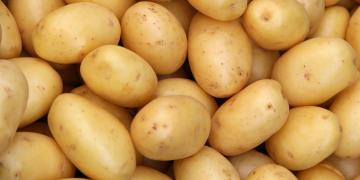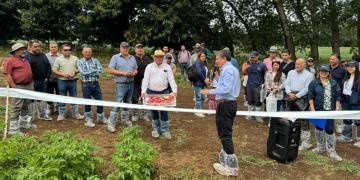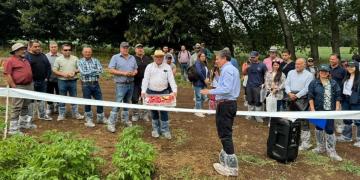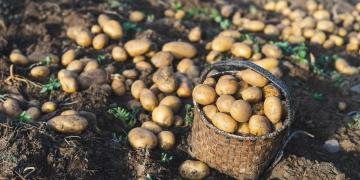Spain (Canary Islands): Despite local production, potatoes from Israel are already arriving.
Part of the ’local’ tubers from the summer harvest are still stored and have no commercial outlet, but that, despite the farmers’ request to delay imports, does not prevent many shelves from displaying the product from abroad.
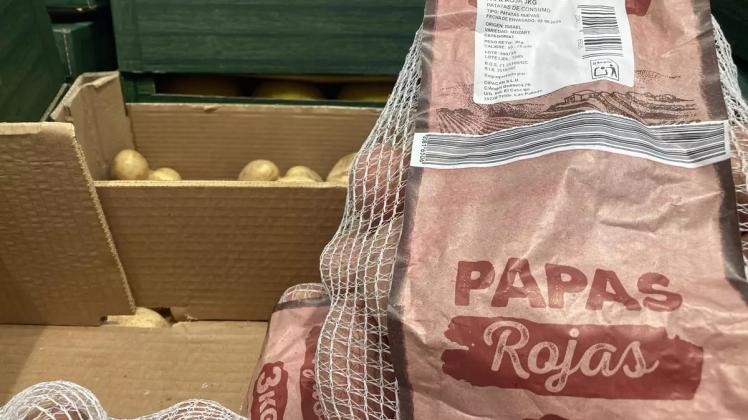
The same thing happens almost always, and it has happened again this summer, despite the requests of local potato producers, mainly of the most consumed varieties, the so-called white ones. And this time, the tubers were imported from Israel, not from Egypt, Cyprus, or the more traditional one from the United Kingdom, at least for now.
Those foreign potatoes, the ones from Israel that are now seen alongside packaged ones as the islands’ harvest in the fruit and vegetable sections of many supermarkets, are already competing with local ones; they hinder and block the exit of the country’s supply, with summer production still stored and therefore available for sale ( there are a few million kilos left ), and they lower or hurt the prices received by island farmers, which are those of the wholesale first transaction. This is what cannot happen, it seems obvious, if what we want is to create wealth on the islands, the so-called endogenous development linked to the primary sector.
Today, potatoes from abroad, for now dominated by those originating in Israel, are widely available in hypermarkets and supermarkets in the Canary Islands, especially in the stores of the Lidl (price in Tenerife was €1.89/kilo for three-kilo bags on Sunday, August 17) and Hiperdino chains, where they have been most frequently seen. Mercadona also usually sells imported potatoes from the Cadimisa company, but currently does not offer them: it only offers local varieties supplied by the Garañaña Cooperative, which is linked to the Casmi group, as is Cadimisa.
In those cases, the ones observed these days, the imports are carried out by two Canary Islands companies: Dipacan, for Lidl, and Copacan Canarias, for Hiperdino. This information is visible to all potential consumers at those retail outlets.
Despite the meetings convened by the Ministry of Agriculture with all the potato-related stakeholders on the islands—public administrations, producers, importers, and retailers—and after a request from local farmers to give preference to domestic potatoes in the summer so they can be brought to market at profitable prices for local growers (around one euro per kilo, as the Canary Islands Government’s Agriculture Minister, Narvay Quintero, routinely acknowledges), the foreign product is already here, and once again, it is the Israeli potato that has the greatest presence on fresh produce shelves.
The invitation from professional agricultural organizations, cooperatives, and local producers, in conjunction with the Regional Ministry and addressed to importers (wholesalers) and retailers on the islands, appears to have been of no use. The idea was to halt or delay the arrival of imported potatoes this summer, as this product is already available in some of the most important sales centers in the Canary Islands. And perhaps worst of all: the decision to import was made without all the local mid-season production—the one harvested during the summer months—being completely sold and with enough stock to cover current demand at acceptable prices, as local producers repeatedly emphasize.
The truth is that there are potatoes in storage, and few are being dug or harvested from the cultivated plots in the upper midlands on the northern slopes. Now, doubts arise about when the country’s call will be sold and at what price. Currently, wholesalers pay between €0.60 and €0.75 per kilo for local production.
Almost 80 million kilos of Canarian potatoes in 2023
According to statistics from Istac, used by the Canary Islands government as a source, local potato production in 2023 reached 78,304 tons (almost 80 million kilos), with a cultivated area of 6,710 hectares, and declining. In ten years, from 2013 to 2023, the year with the most recent data, the cultivated area has decreased by almost 40% and harvested production by 25%. Imports are gradually gaining ground in the island market, despite the 100,000 additional residents and the four million annual increase in tourists over the same decade.
the article continues after the next messageThis 2025, we’re celebrating at Canarias Ahora as we celebrate our first quarter-century of commitment to our readers. 25 years of journalism defending democratic values in a land rife with corruption and trickery. We’re the first digital newspaper in the Canary Islands, not only for being the first digital native to see the light of day when no one believed in online journalism, but also because we’ve held first place in every audience measurement audit since then.
We can also boast of not being afraid of the powerful, of publishing what few have dared to, and of staunchly defending people’s rights, especially those of the most vulnerable groups. And we’ve done this thanks to our reading community and our members, who support us so we don’t have to rely on advertising or institutions.
Regarding imports, the islands accounted for 64 million kilos originating outside Spain that same year, while in 2024 this figure dropped to 61 million, with a total value of €39 million. The United Kingdom remains the main supplier, accounting for nearly two-thirds of the total volume of potatoes imported from the archipelago, followed by Egypt, with a presence in Israel and even Cyprus.
Last year, in 2024, Canarian producers received an average of between 0.7 and 1.3 euros per kilo at source, the income obtained from the sale of their harvest, while the average market sale price ranged between 2.3 and 3.1 euros, according to ISTAC (National Institute of Agricultural Statistics). The difference between what local producers received and the final price of their potatoes sold at points of sale is nearly three times the agricultural income obtained.
Fuente:

